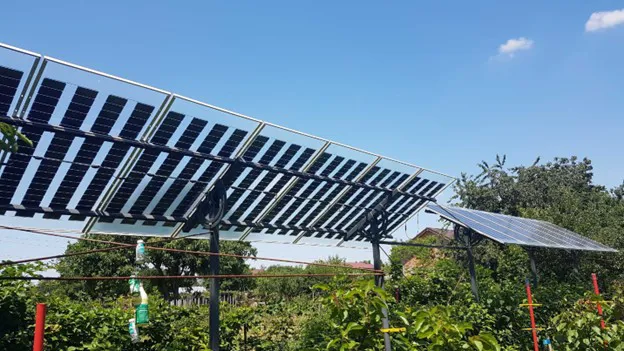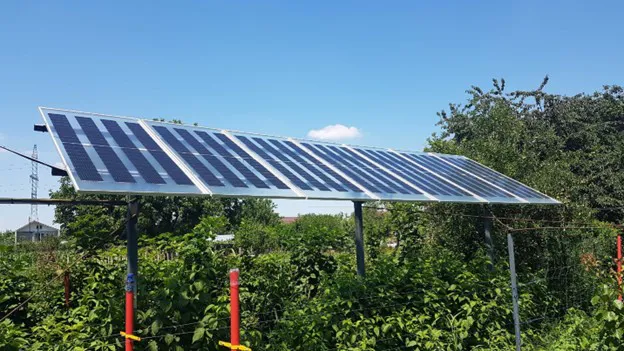The increasing temperatures in recent years have posed challenges to the cultivation of berry bushes like raspberries, blackberries, blueberries, and currants. Further, the demands for initial processing or industrialization within fruit plantations to improve farm profitability have led to a significant rise in electricity and water consumption.
These demands can now be addressed through innovative technologies merging agriculture and renewable energy production. This concept, known as "Agrivoltaics" or "photovoltaic energy-assisted agriculture," applies photovoltaic systems to the same agricultural land.
As we entered 2023, InterNET SRL, through its new "OFRIM energy" division, in collaboration with a local farmer, initiated the planning and integration of an Agrivoltaics photovoltaic system in Cornetu village, Romania. This system, tailored for raspberry and blackberry cultivation, marks the first of its kind in Romania.


Equipped with two 9kW hybrid inverters from the French company Imeon Energy, a set of solar batteries, and two kinds of photovoltaic panels - non-transparent and semi-transparent ones for agricultural use - the system aims to meet over 80% of the farm's annual micro-industrial electricity requirements. Besides the anticipated benefit of low-cost electricity, the system also foresees a potential increase in raspberry and blackberry yield, owing to the protective and shading qualities of the semi-transparent panels installed above the crops.
This pioneering venture came to fruition thanks to a robust partnership between an experienced Romanian farmer - specialized in cultivating shrubs and raising poultry - and InterNET SRL, a company proficient in renewable energy systems. The latter has previously implemented an "Agrivoltaics" project with other specialized local firms in Romania.
By aiding farmers interested in Agrivoltaics, InterNET SRL seeks to introduce the dual-use knowledge of agriculture and photovoltaic systems to the Romanian agricultural sector for the first time. This approach is anticipated to strengthen investment security, business growth and provide additional income avenues for farmers.

This inaugural project also focuses on examining various metal structure designs, each tailored to support the semi-transparent photovoltaic panels above the crops. These designs will be studied in conjunction with diverse harvesting methods to enhance the efficiency of raspberry and blackberry production. Furthermore, financial elements, such as the cost implications associated with particular work conditions, the selected metal structure, and the placement of crucial photovoltaic system components, such as hybrid inverters or solar batteries, will undergo thorough analysis. This careful financial evaluation is aimed at boosting overall efficiency and deriving maximum benefits from these types of projects.
To equip farmers, the end-users, with enhanced abilities and conveniences in the upcoming period, a significant and innovative addition will be incorporated into the photovoltaic system. This new component is a measurement and control unit designed to monitor various environmental and technological parameters in real time and remotely. The unit will offer up-to-date data on the soil condition in specified crop areas, such as temperature, humidity, solar radiation, and soil quality. Essentially, the processed information from this unit will play a vital role in devising strategies to safeguard crops against potential damages caused by unpredictable weather conditions or various pests.
During the final tests of the photovoltaic system, Dr. Eng. Dragos Ofrim engaged in a conversation with a group of farmers present at the event. He conveyed that Agrivoltaics projects open new doors for horticulture to potentially enhance production on modest agricultural lands of 1 to 2-3 hectares, given the increasingly challenging climatic conditions, particularly during the months of July and August. Moreover, the readily available low-cost energy resource in the immediate proximity of the farming and small industrialization areas provides Romanian farmers with innovative income sources, contributing directly to the future growth and development of each farm. Hence, the OFRIM energy team is convinced of the many mutual advantages for agricultural land that integrate photovoltaic systems for plant cultivation and growth. According to recent studies, implementing Agrivoltaics technologies can potentially boost agricultural output on the used land by over 20-30% while concurrently decreasing the water consumption in associated irrigation systems by a minimum of 40%.
Collaboration, research, and testing to broaden agrivoltaics applications and enhance farmer revenues
The foundation of this pilot project rests on a collaborative partnership between a farmer skilled in shrub and bird cultivation and a tech company with expertise in electronics, electrical engineering, and IT. Beyond project realization, they also aim to share all findings and outcomes with potential photovoltaic application developers, investors, energy firms, and other stakeholders interested in emerging Agrivoltaics technologies. The objective is to foster and guide future projects that will enhance and implement agriculture assisted by photovoltaic energy.
"We are confident that such projects, incorporating state-of-the-art electronics and IT technologies, including artificial intelligence techniques, can boost the generation of sustainable, clean energy. Moreover, they can serve as a protective shield for our deteriorating and nutrient-depleted agricultural lands. By providing a sustainable avenue for business development, these projects offer farmers resilience in the face of increasingly harsh and unpredictable weather conditions."
For more information:
InterNET Ltd
21, Comana str., RO-011273, District 1,
Bucharest, Romania
Mob.: +40 744 362 378, +40 754 216 171
Email: [email protected], [email protected]
www.imeon-energy.com
